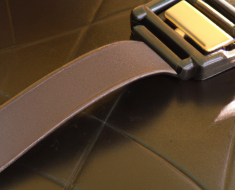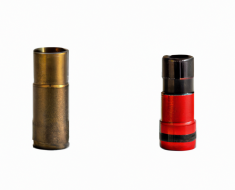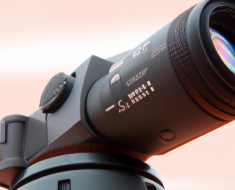“Enhance accuracy and reduce recoil with a compensator on your handgun.”
Improved Recoil Control
If you are a handgun enthusiast looking to improve your shooting accuracy and control, adding a compensator to your firearm could be a game-changer. A compensator is a device attached to the end of the barrel that helps reduce recoil and muzzle rise when firing a gun. This can lead to more accurate and consistent shots, making it a valuable addition for competitive shooters, law enforcement officers, and recreational shooters alike.
One of the primary benefits of adding a compensator to your handgun is improved recoil control. When you fire a gun, the force of the expanding gases pushing the bullet out of the barrel creates recoil, causing the gun to move backwards and upwards. This can make it difficult to stay on target and quickly realign for follow-up shots. A compensator works by redirecting some of these gases upward and outward, counteracting the forces that cause muzzle rise and reducing felt recoil.
By reducing recoil and muzzle rise, a compensator allows you to maintain better control over your handgun during rapid fire or multiple shots. This can lead to tighter shot groupings, faster follow-up shots, and increased shooting accuracy overall. Whether you are competing in a match, training at the range, or defending yourself in a high-stress situation, having improved recoil control can give you a significant advantage.
In addition to improved recoil control, a compensator can also help mitigate muzzle flip, which is the upward movement of the muzzle when firing a gun. Muzzle flip can make it challenging to keep your sights on target and quickly acquire new targets. By reducing muzzle flip, a compensator allows you to stay on target more easily and transition between targets more quickly. This can be particularly beneficial in dynamic shooting scenarios where speed and accuracy are crucial.
Another advantage of adding a compensator to your handgun is reduced felt recoil. Recoil can be uncomfortable and even painful for some shooters, especially when firing powerful calibers or high round counts. A compensator helps absorb and redirect some of this energy, making shooting more comfortable and enjoyable. This can encourage shooters to practice more frequently and for longer periods without experiencing fatigue or discomfort.
Furthermore, a compensator can also help extend the life of your handgun by reducing wear and tear on critical components. Recoil forces can put stress on the frame, slide, and other parts of the gun, potentially leading to premature wear or damage. By reducing recoil with a compensator, you can help preserve the longevity and reliability of your firearm.
In conclusion, adding a compensator to your handgun offers numerous benefits, including improved recoil control, reduced muzzle flip, increased shooting accuracy, enhanced comfort during shooting sessions, and prolonged firearm longevity. Whether you are a competitive shooter looking for an edge in matches or a recreational shooter wanting to enhance your shooting experience, a compensator is a worthwhile investment that can elevate your performance on the range or in real-world situations. So why wait? Consider adding a compensator to your handgun today and experience the difference for yourself.
Increased Accuracy
When it comes to improving your accuracy with a handgun, there are many accessories and modifications that can help. One such accessory that is often overlooked but can make a significant difference is a compensator. A compensator is a device attached to the end of the barrel of a handgun that helps reduce recoil and muzzle rise. This can lead to more accurate shots and faster follow-up shots.
One of the main benefits of adding a compensator to your handgun is the reduction in recoil. Recoil is the backward movement of a gun when it is fired, and it can cause the shooter to lose control of their aim. By redirecting some of the gases produced when the gun is fired, a compensator can help counteract this recoil, making it easier for the shooter to stay on target.
In addition to reducing recoil, a compensator can also help reduce muzzle rise. Muzzle rise occurs when the front end of the gun rises up after firing, which can also throw off your aim. By redirecting some of the gases upward, a compensator can help keep the muzzle down and improve your overall accuracy.
Another benefit of adding a compensator to your handgun is that it can help you shoot faster. With less recoil and muzzle rise to contend with, you can get back on target more quickly for follow-up shots. This can be especially useful in competitive shooting or self-defense situations where every second counts.
It’s important to note that not all handguns are compatible with compensators, so be sure to check with your manufacturer before making any modifications. Additionally, adding a compensator may change the way your gun handles and shoots, so it’s important to practice with it before relying on it in a high-pressure situation.
Overall, adding a compensator to your handgun can have several benefits when it comes to accuracy. By reducing recoil and muzzle rise, you can improve your overall shooting performance and increase your chances of hitting your target. Whether you’re a competitive shooter looking for an edge or someone who wants to feel more confident in their ability to defend themselves, a compensator is definitely worth considering.
In conclusion, adding a compensator to your handgun can have several benefits when it comes to accuracy. By reducing recoil and muzzle rise, you can improve your shooting performance and increase your chances of hitting your target. Whether you’re a competitive shooter or someone who wants to feel more confident in their ability to defend themselves, a compensator is definitely worth considering. Just be sure to practice with it before relying on it in a high-pressure situation and always check with your manufacturer before making any modifications.
Faster Follow-Up Shots
When it comes to shooting handguns, one of the key factors that can greatly impact your performance is the ability to quickly and accurately fire follow-up shots. Whether you are a competitive shooter, a law enforcement officer, or a civilian looking to improve your shooting skills, being able to rapidly engage multiple targets is essential. One way to enhance your ability to fire faster follow-up shots is by adding a compensator to your handgun.
A compensator is a device that attaches to the end of the barrel of a handgun and helps to reduce muzzle rise and recoil. By redirecting gases upwards as the bullet leaves the barrel, a compensator can help keep the muzzle of the gun down and on target, allowing for faster and more accurate follow-up shots. This can be especially beneficial when shooting in rapid succession or when engaging multiple targets in quick succession.
One of the key benefits of adding a compensator to your handgun is that it can help you maintain better control over your firearm during rapid fire. When firing multiple shots in quick succession, recoil can cause the muzzle of the gun to rise, making it more difficult to stay on target. A compensator helps mitigate this by redirecting gases upwards, counteracting the upward movement of the muzzle and allowing you to maintain better control over your firearm.
In addition to helping you control muzzle rise and recoil, a compensator can also help reduce felt recoil. This can make shooting more comfortable and enjoyable, as well as help you maintain better accuracy and consistency in your shooting. By reducing felt recoil, a compensator can also help reduce fatigue and strain on your hands and arms, allowing you to shoot for longer periods without experiencing discomfort.
Another benefit of adding a compensator to your handgun is that it can help improve your overall shooting performance. By reducing muzzle rise and recoil, a compensator can help you stay on target more easily and quickly between shots. This can result in faster follow-up shots, increased accuracy, and improved shot placement. Whether you are shooting in competition or for self-defense purposes, having the ability to engage targets quickly and accurately can be a game-changer.
In conclusion, adding a compensator to your handgun can offer a range of benefits when it comes to shooting faster follow-up shots. By helping reduce muzzle rise and recoil, a compensator can improve your ability to control your firearm during rapid fire, reduce felt recoil, and enhance overall shooting performance. Whether you are looking to improve your competitive shooting skills or simply want to enjoy more comfortable and accurate shooting experiences, consider adding a compensator to your handgun for improved performance on the range.
Reduced Muzzle Rise
When it comes to shooting handguns, one of the key factors that can greatly affect your accuracy is muzzle rise. Muzzle rise refers to the upward movement of the front end of the handgun when fired, which can cause the shooter to lose control and accuracy. One effective way to reduce muzzle rise is by adding a compensator to your handgun.
A compensator is a device attached to the end of the barrel that helps redirect gases produced when firing a round. This redirection of gases helps counteract the upward movement of the gun, resulting in reduced muzzle rise. By reducing muzzle rise, a compensator can help you stay on target and improve your overall shooting accuracy.
One of the main benefits of adding a compensator to your handgun is improved follow-up shot accuracy. When shooting rapidly, muzzle rise can make it difficult to quickly realign your sights for subsequent shots. With a compensator, you can keep your handgun more stable and on target, allowing you to take faster follow-up shots with greater precision.
In addition to improved follow-up shot accuracy, a compensator can also help reduce felt recoil. Felt recoil refers to the kickback or impact felt by the shooter when firing a round. By redirecting gases and countering muzzle rise, a compensator can help absorb some of the energy produced during firing, resulting in less felt recoil. This can make shooting more comfortable and enjoyable, especially during long shooting sessions.
Another benefit of adding a compensator to your handgun is increased control. With reduced muzzle rise and felt recoil, you can maintain better control over your firearm, allowing you to shoot more accurately and confidently. Whether you are a competitive shooter looking to improve your performance or a recreational shooter wanting to enhance your shooting experience, a compensator can help you achieve greater control over your handgun.
Furthermore, a compensator can also help prolong the life of your handgun by reducing wear and tear on critical components. Muzzle rise and felt recoil can put stress on the barrel and other parts of the firearm, potentially leading to premature wear or damage. By mitigating these forces, a compensator can help extend the lifespan of your handgun and ensure reliable performance over time.
Overall, adding a compensator to your handgun offers a range of benefits that can enhance your shooting experience. From reduced muzzle rise and improved follow-up shot accuracy to decreased felt recoil and increased control, a compensator can help you shoot more accurately and comfortably. Additionally, by reducing wear and tear on your handgun, a compensator can also help prolong its lifespan and ensure reliable performance for years to come.
In conclusion, if you are looking to improve your shooting skills and overall performance with your handgun, consider adding a compensator to your firearm. With its ability to reduce muzzle rise, felt recoil, and increase control, a compensator can provide numerous advantages that will enhance your shooting experience. So why wait? Upgrade your handgun with a compensator today and start reaping the benefits for yourself.
Enhanced Shooting Experience
If you are a handgun enthusiast looking to enhance your shooting experience, adding a compensator to your firearm may be just the upgrade you need. A compensator is a device that attaches to the end of your handgun barrel and helps reduce muzzle rise and recoil. This can result in improved accuracy, faster follow-up shots, and overall better control of your firearm.
One of the key benefits of adding a compensator to your handgun is the reduction in muzzle rise. When you fire a round, the force of the expanding gases pushes the gun upward, causing the muzzle to rise. This can make it difficult to stay on target and slow down your follow-up shots. A compensator works by redirecting some of that gas pressure upward and to the sides, helping to counteract the muzzle rise and keep your gun level during rapid fire.
In addition to reducing muzzle rise, a compensator also helps reduce felt recoil. Recoil is the backward force generated when you fire a round, and it can cause discomfort and affect your shooting accuracy. By redirecting some of the gas pressure to the sides, a compensator can help absorb some of that recoil energy, making shooting more comfortable and allowing you to stay on target more easily.
Improved accuracy is another major benefit of adding a compensator to your handgun. By reducing both muzzle rise and felt recoil, a compensator can help you maintain better control of your firearm and keep your sights on target. This can result in tighter shot groups and more consistent performance, especially during rapid fire or follow-up shots.
Furthermore, a compensator can also help enhance your shooting speed. With reduced muzzle rise and felt recoil, you can recover from each shot more quickly and get back on target faster. This means you can shoot more accurately and efficiently, whether you are competing in a match or practicing at the range.
Overall, adding a compensator to your handgun can greatly improve your shooting experience. Not only does it help reduce muzzle rise and felt recoil, but it also enhances accuracy, speed, and overall control of your firearm. Whether you are a competitive shooter looking for an edge or just want to enjoy more comfortable and precise shooting sessions, a compensator is a worthwhile investment.
In conclusion, if you are looking to take your handgun shooting to the next level, consider adding a compensator to your firearm. With its ability to reduce muzzle rise, felt recoil, improve accuracy, speed up follow-up shots, and enhance overall control, a compensator can greatly enhance your shooting experience. Give it a try and see the difference for yourself – you won’t be disappointed!






